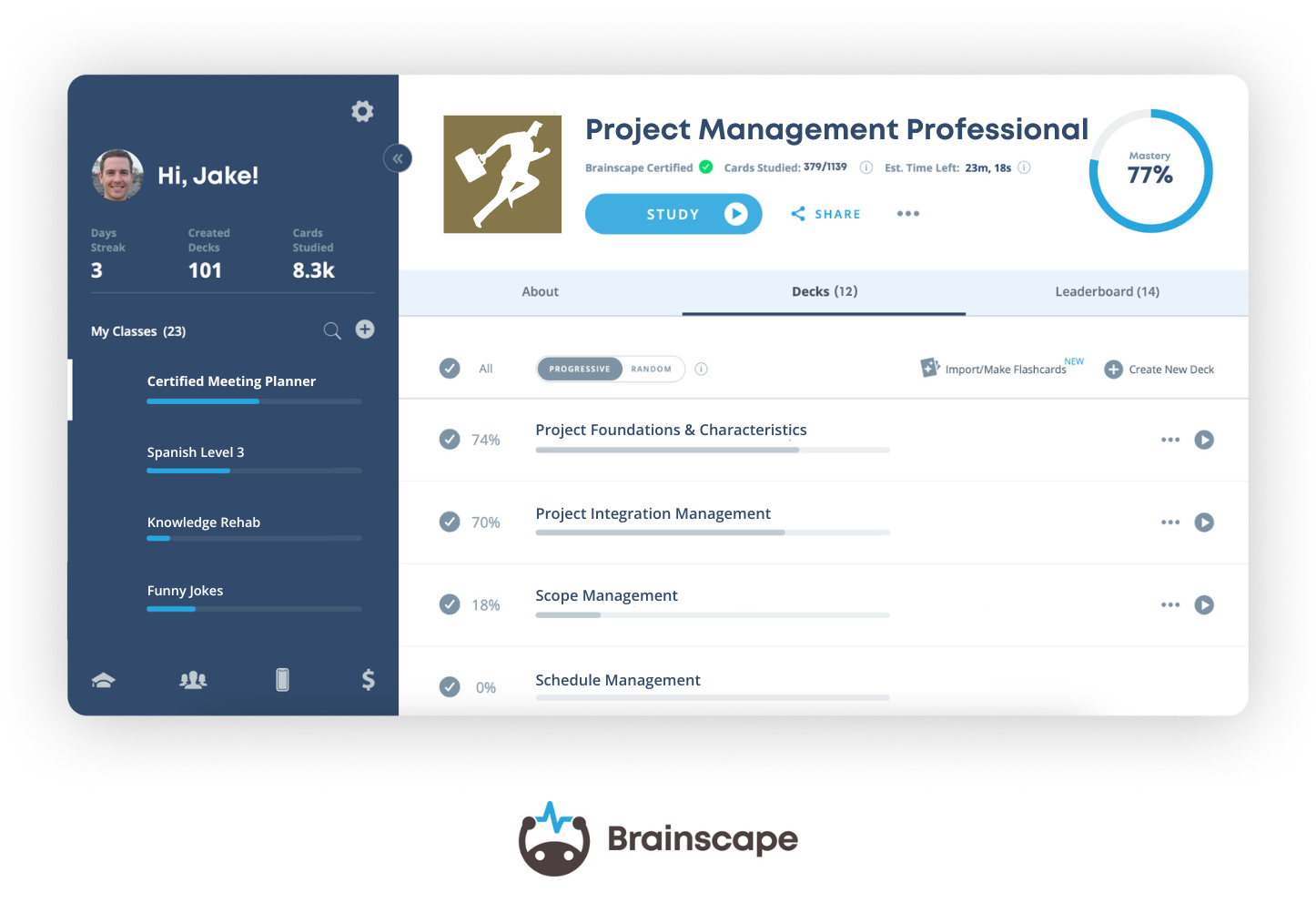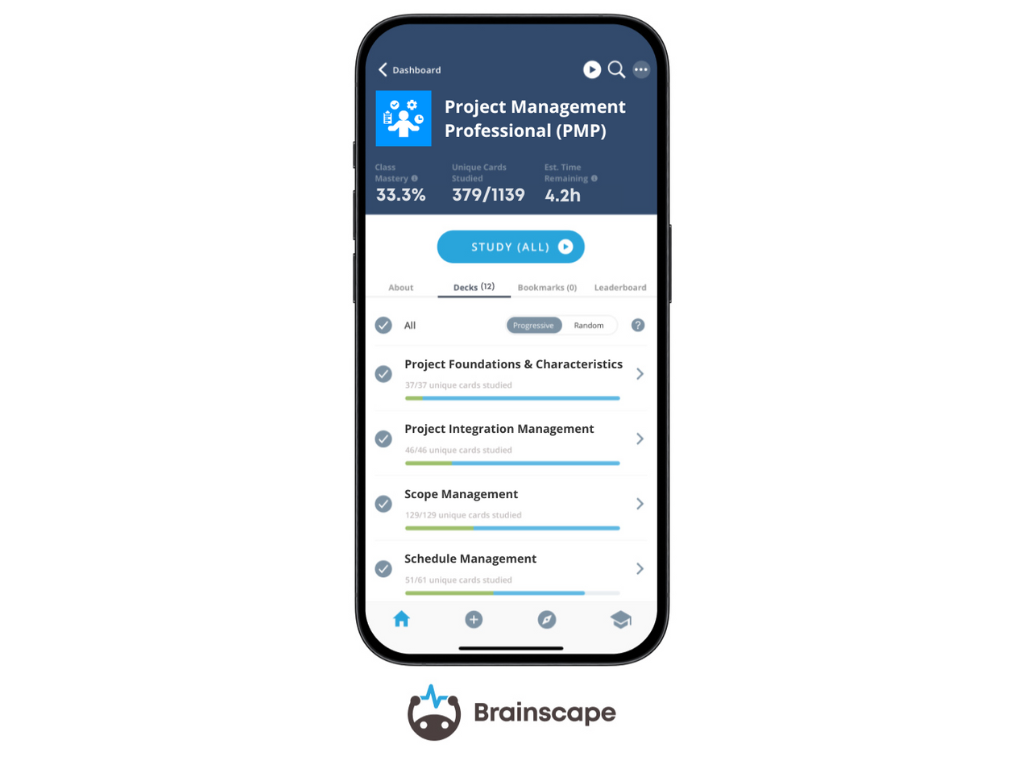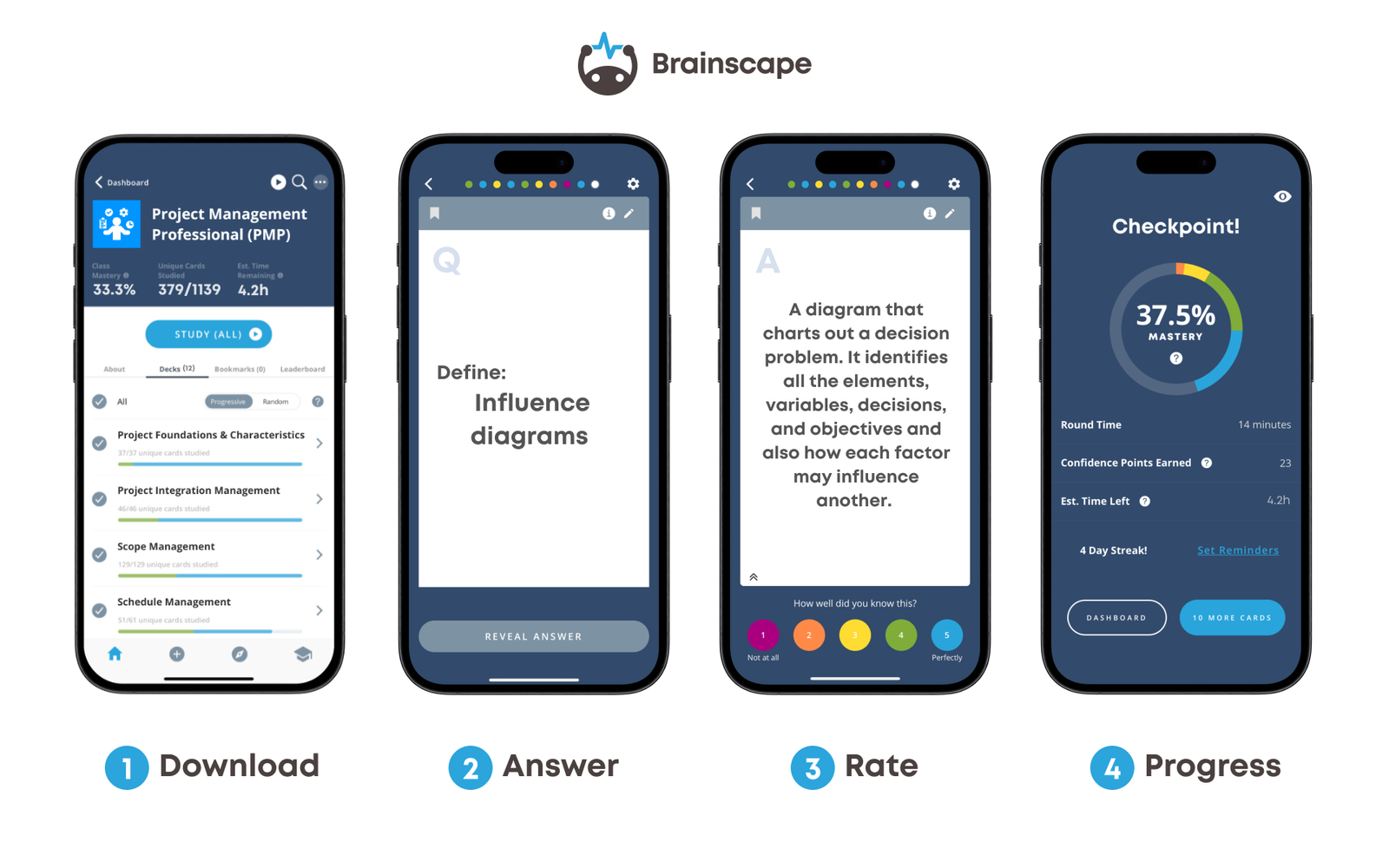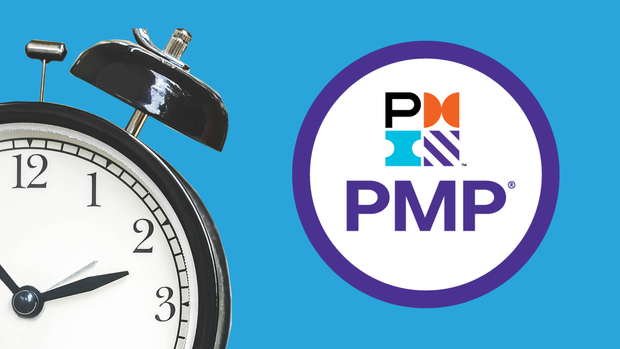Whether you’re just beginning your PMP® course or staring down the final stretch before exam day, you’ve probably got a few burning questions: How long is the PMP exam? How is it structured? How many breaks do I get? How should I manage my time across 180 questions? How long should I study for the PMP? And how much time do I need for project management training?
This article answers all of those questions and more. We’ll break down the exact exam format, how much time you’ll have, what types of questions to expect, and how to mentally prepare for long-haul computer-based tests.
If you’ve accumulated the hours of project management experience and are planning to take the PMP soon, you’re in the right place!
But First… Who Are We?
We're Brainscape, a smart flashcards app. We've worked with a leader in the field of PMP exam prep, Instructing.com, to create a comprehensive, accurate set of PMP flashcards that every exam candidate should use to ingrain and retain the crucial concepts necessary to answer the more complex questions on the real exam.

These PMP flashcards are designed to help you ingrain the core project management concepts you’ll need to answer the complex scenario-based questions that the PMP exam is known for.

We also asked the Instructing.com team for their best advice on managing the PMP exam itself: everything from timing strategy to what to expect in the testing center.
Here’s what they shared…
Why is it Important to Understand the PMP Exam Duration and Structure?
Because time is money—and running out of it mid-exam is a one-way ticket to Stressville.
Understanding how long the PMPⓇ certification exam is and how it’s structured helps you prepare better, practice more efficiently, and keep your cool when the clock starts ticking.
But it also does something else that’s just as critical: it helps you build a realistic, sustainable study strategy. Knowing what the exam demands gives you a clear target to work toward: 180 questions, three domains, and nearly four hours of focus. That means you can break your prep into smaller, consistent sessions that actually fit around your work, life, and whatever projects you’re already juggling.
No all-nighters. No burnout. Just steady progress.
How Long Is the PMP Exam?
Total Time Allocated
The PMP exam time limit is 230 minutes (3 hours and 50 minutes). Nearly four hours might seem like a long exam, but in comparison with your hundreds of hours of project management experience, this is a very short window in which to assess you. During this time, you’ll be answering 180 questions, so you’ve got roughly 76 seconds per question to read, analyze, and answer. Tick-tock!
Exam Sections and Timing
The PMP exam is broken into three parts, with each section containing about 60 questions. You’ll have a total of 230 minutes (3 hours and 50 minutes) to complete all 180 questions.
You’ll be offered a 10-minute optional break after finishing Section 1 and again after finishing Section 2. Once you begin the next section, there’s no going back to review previous answers. So double-check your responses and flagged questions before moving on.
While the time isn’t divided strictly by section, it’s a good idea to aim for about 60 minutes per section, giving yourself a 10-minute cushion for review and breaks.
Scheduled Breaks
You’ll get two 10-minute breaks during the exam. The first one happens after you answer and review the first 60 questions. The second break becomes available after 120 questions. Use them wisely: stretch, hydrate, or do a little victory dance. Whatever gets you energized to re-enter the fray!
What Is the Structure of the PMP Exam?
Number of Questions
You’ll face 180 questions total. Don’t worry! Not all of them count. Some are experimental questions that the Project Management Institute is testing out. You won’t know which ones those are, so prepare to answer every question with full effort.
Types of Questions
Expect a mix: multiple choice, multiple response, matching, hotspot, and fill-in-the-blank. Most are scenario-based, so you’ll need to apply your knowledge, not just regurgitate definitions.
Use of Scratch Paper and Calculator
You’ll be given an on-screen whiteboard and calculator. If you're testing in person, you might get actual scratch paper, depending on the testing center’s policy. Either way, don’t expect a full art set, but you should have enough blank space to sketch out your brainwork.
Why do you need a whiteboard or scratch paper? Because many PMP questions involve calculations, flowcharts, or process mapping. Jotting down key formulas, drawing timelines, or sketching out decision trees can be incredibly helpful in working through the more complex scenario-based questions.
Whether digital or physical, make sure you’re comfortable using a simple workspace to externalize your thinking, especially under timed conditions.
How Long Should You Study for the PMP Exam?
Recommended Study Timeline
Most project management professionals recommend dedicating 2 to 3 months of consistent, focused study time to prepare for the PMP exam. That might sound like a lot, but remember: you’re not just memorizing facts. You’re learning to apply decades of project management experience across a range of tricky, real-world scenarios.
How long you study will depend on your background, your work schedule, and how familiar you already are with the Project Management Institute’s way of thinking. But here’s a rough breakdown of how your timeline might look:
- Weeks 1–2: Get familiar with the Exam Content Outline (ECO), take a diagnostic quiz, and set your study plan.
- Weeks 3–8: Deep-dive into each exam domain using structured coursework, flashcards, and real-world examples.
- Weeks 9–10: Focus on practice exams, review weak spots, and refine your understanding of tricky concepts.
- Weeks 11–12: Ramp up your review, simulate test conditions, and sharpen your time-management skills.
Whatever timeline you choose, the key is deliberate practice: not just reading but reviewing, recalling, and applying.
Enter Brainscape, the adaptive web and mobile flashcard platform designed to make your study time ridiculously efficient. Brainscape’s PMP flashcards are aligned with the official PMP® Exam Content Outline (ECO) and were co-created with Instructing.com, one of the most trusted names in PMP prep.
Here’s how it works: Brainscape delivers content in a bite-sized Q&A format, leveraging multiple cognitive science tactics to help you learn as efficiently and painlessly as humanly possible. You rate your confidence after each flashcard, and the system uses that feedback to show you the right cards at the right intervals so you (1) drill yourself on your weaknesses and (2) save time reviewing what you already know. It’s like having a personal study coach that lives in your pocket.
You can study on the go with our synced mobile and web flashcards. Only have two minutes between meetings? That’s enough time to knock out some flashcards. Brainscape’s flashcards are designed for the busy lifestyle of project management professionals.
If you're serious about passing the PMP exam, practicing with real-style questions, and internalizing key concepts, Brainscape is your ultimate study weapon.
How Can I Manage My Time Effectively on PMP Exam Day?
You’ve got 230 minutes to answer 180 questions, which gives you roughly 76 seconds per question. Don’t spend five minutes locked in battle with a tricky question. If you're stuck, mark it, move on, and come back later with fresh eyes. Use your first pass to rack up easy wins and build confidence, and then revisit the more complex questions.
Read Carefully. Then Answer.
Rushing through a question just to save time can backfire. Instead, read each question carefully, understand what it’s actually asking, and then deliver a clear, targeted response based on your exam study and project management experience. Many candidates waste precious time second-guessing or over-explaining. If you pause and plan your approach, your answers will be sharper and faster. (No rambling required!)
Utilize Scheduled Breaks Wisely
You’ll get two scheduled 10-minute breaks after the first and second blocks of 60 questions. Take them. Get up, stretch, hydrate, and breathe. These short reset windows can help you re-center your focus and finish strong, especially in that final push.
Set Yourself Up for Success Before Exam Day
Whether you’re testing online or in person, plan to arrive (or log in) at least 30 minutes early. This gives you time to check in, settle your nerves, and troubleshoot any unexpected tech or travel issues. If you’re going to a test center, consider practicing the commute the day before at the same time as your test in order to avoid surprises like construction delays or parking drama.
What Happens If You Need to Retake the PMP Exam?
You can take the PMP exam up to three times within one year of your application approval. If you don’t pass after three tries, you’ll need to wait a year before applying again.
If you don’t pass on the first attempt, take it as a learning opportunity. Pinpoint your weak spots, double down with Brainscape’s flashcards, and attack it again. Many people pass on the second go, especially with better insight and a smarter plan.
How Long is the PMP Exam FAQ
Can I pass the PMP exam in 10 days?
It might be possible if you already have 10+ years of experience as a project manager, as well as a lot of good luck! However, we do NOT advise you to take this exam after only 10 days of studying! You need time to ingrain the facts and to answer PMP exam questions on practice tests. While it might be possible in rare cases, we encourage you to take at least 2 months to prepare for this exam. Remember that this is a stepping stone in a longer-term journey. To maintain this accreditation, you’ll need to complete Professional Development Units each year.
What is the pass rate for the PMP exam?
The Project Management Institute doesn’t publish an official passing score, but it’s estimated to be around 60–70% for first-time test takers. Just like every other situation in your project management career, preparation makes all the difference.
Can I pass the PMP exam in 3 weeks?
Maybe, but it’s not likely! The usual recommended preparation time for project management certification is closer to 3 months, so condensing that into 3 weeks would involve an extreme time commitment and capacity to absorb information at four times the recommended pace.
Final Thoughts: Plan Your Time, Pass with Confidence
So, how long is the PMP certification exam? Long enough to test your skills, but not too long to master with a good strategy.
With 230 minutes on the clock and a sea of scenario-based questions ahead, time management is key, not just on test day but from day one of your study plan.
Brainscape’s PMP flashcards are your ultimate study weapon: aligned with the Exam Content Outline, designed by experts, and powered by science. Whether you’ve got ten weeks or ten days, we’ll help you make every minute count.
Start studying smarter today, and walk into that exam with confidence (and maybe even a little swagger).

Additional Reading:
Disclaimer: Brainscape and Instructing.com are not affiliated in any way with the Project Management Institute. The advice we provide in this guide is based on the information presented on the PMI website.
